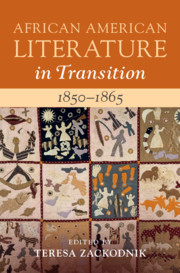Book contents
- African American Literature in Transition, 1850–1865
- African American Literature In Transition
- African American Literature in Transition, 1850–1865
- Copyright page
- Contents
- Figures
- Contributors
- Preface
- Chronology, 1850–1865
- Introduction
- Part I Black Personhood and Citizenship in Transition
- Chapter 1 Freedom’s Accounts
- Chapter 2 Conduct Discourse, Slave Narratives, and Black Male Self-Fashioning on the Eve of the Civil War
- Chapter 3 Picturing Black Authorship with and against Stowe’s Lens
- Chapter 4 African American Periodicals and the Transition to Visual Intercourse
- Part II Generic Transitions and Textual Circulation
- Part III Black Geographies in Transition
- Bibliography
- Index
Chapter 1 - Freedom’s Accounts
The Semi-Citizenship Narrative
from Part I - Black Personhood and Citizenship in Transition
Published online by Cambridge University Press: 07 April 2021
- African American Literature in Transition, 1850–1865
- African American Literature In Transition
- African American Literature in Transition, 1850–1865
- Copyright page
- Contents
- Figures
- Contributors
- Preface
- Chronology, 1850–1865
- Introduction
- Part I Black Personhood and Citizenship in Transition
- Chapter 1 Freedom’s Accounts
- Chapter 2 Conduct Discourse, Slave Narratives, and Black Male Self-Fashioning on the Eve of the Civil War
- Chapter 3 Picturing Black Authorship with and against Stowe’s Lens
- Chapter 4 African American Periodicals and the Transition to Visual Intercourse
- Part II Generic Transitions and Textual Circulation
- Part III Black Geographies in Transition
- Bibliography
- Index
Summary
Stephen Knadler challenges the alignment of physical mobility with freedom by elaborating on the debt crisis and exclusion of the mobile freeman discursively constructed as a semi-citizen under mid-century racial capitalism. In doing so, he explores the limits to aligning African American autobiographical writing primarily with the slave narrative by making a case for the emergence of a new autobiographical genre that he calls the semi-citzenship narrative. Emerging in the decade before the Civil War and written predominantly, though not exclusively, by men, this genre complicates “understanding of the relation among antebellum citizenship making, Black freedom struggles and racial capitalism.” The semi-citizenship narrative, he argues, constitutes an ignored history of the “afterlife of free labor” that unsettles the racialization of Blackness as social and legal death and whiteness as free waged labor and citizenship. That unsettling is staged through a “quasi-citizenship” articulated in accounts of the freeman’s indebtedness and “excluding out” by writers such as William Grimes, Samuel Ringgold Ward, Thomas Smallwood, and Austin Steward. Knadler argues that these writers were using their narratives to account for the “unfolding and incomplete transition of the enslaved into a third term, a so-called free person who was not quite a citizen nor yet enslaved.”
Keywords
- Type
- Chapter
- Information
- African American Literature in Transition, 1850–1865 , pp. 25 - 47Publisher: Cambridge University PressPrint publication year: 2021



